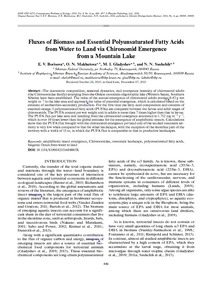Fluxes of biomass and essential polyunsaturated fatty acids from water to land through chironomid emergence from a mountain lake
Скачать файл:
URI (для ссылок/цитирований):
https://elib.sfu-kras.ru/handle/2311/27984Автор:
Борисова, Е. В.
Махутова, О. Н.
Гладышев, М. И.
Сущик, Н. Н.
Коллективный автор:
Институт фундаментальной биологии и биотехнологии
Кафедра водных и наземных экосистем
Дата:
2016Журнал:
Contemporary Problems of EcologyКвартиль журнала в Scopus:
Q3Квартиль журнала в Web of Science:
Q4Библиографическое описание:
Борисова, Е. В. Fluxes of biomass and essential polyunsaturated fatty acids from water to land through chironomid emergence from a mountain lake [Текст] / Е. В. Борисова, О. Н. Махутова, М. И. Гладышев, Н. Н. Сущик // Contemporary Problems of Ecology. — 2016. — Т. 9 (№ 4). — С. 446-457Аннотация:
Taxonomic composition, seasonal dynamics of biomass of Chironomidae adults that emerged from mountain oligotrophic lake Oiskoe (West Sayan, South Siberia). Value of annual emergence of chironomids averaged for the lake area was 0.42 g of wet weight m−2 and was similar to the value of potential emergence which was calculated from zoobenthos secondary production. For the first time, fatty acid composition and contents of essential omega-3 polyunsaturated fatty acids (PUFA) were compared between larvae and adult stages of chironomids. Content of PUFA per wet weight unit in adult biomass was more than 7-fold higher as compared to that in their larvae. Flux of PUFA per a lake area unit due to chironomid emergence accounted for 1.752 mg m−2 y−1, and it was in 10 times lower than the global export estimation through amphibiotic insect emergence. Calculations showed that flux of PUFA brought with chironomid emergence per a land unit of the studied mountain territory was very low as compared to that for other landscapes. However, the calculated flux per a land unit within the first 15 m of shoreline was much higher and similar to that in productive landscapes.
Коллекции:
Метаданные:
Показать полную информациюСвязанные материалы
Показаны похожие ресурсы по названию, автору или тематике.
-
Флуоресцентные методы для оценки внутривидовых особенностей выхода из состояния зимнего покоя у хвойных из южной и северной частей ареалов
Дьяченко, В. С.; Dyachenko, V. S. (Сибирский федеральный университет, 2017-03-06) -
Temporary Migration in India: Findings from Statistical Data and Learnings from Case Studies
Kochkin, Evgeny V.; Sircar, Srilata; Кочкин, Е.В.; Сиркар, Шрилата (Сибирский федеральный университет. Siberian Federal University., 2014-10)The subject of rural-urban migration in India and its close association with the question of rural development has been studied over a long period of time. Official data suggests that short-term migration is a rare ... -
Constitutional Court of the Russian Federation, Decision from 19 April 2016, No. 12-P/16. An Assessment from a German Point of View
Haak, Julia; Хаак, Ю. (Сибирский федеральный университет. Siberian Federal University, 2017-06)The constitutional decision from 19 April 2016, No. 12-P/16 was the first case in connection with a request concerning the implementation of decisions from the Strasbourg Court in the Russian Federation. It has its roots ... -
Fluxes of Biomass and Essential Polyunsaturated Fatty Acids from Water to Land via Chironomid Emergence from a Mountain Lake
Borisova, E. V.; Makhutova, O. N.; Gladyshev, M. I.; Sushchik, N. N. (2016)The taxonomic composition, seasonal dynamics, and emergence intensity of chironomid adults (the Chironomidae family) merging from Oiskoe mountain oligotrophic lake (Western Sayan, Southern Siberia) have been established. ... -
Systematics and biology of some species of Micrurapteryx Spuler (Lepidoptera, Gracillariidae) from the Holarctic Region, with re-description of M. caraganella (Hering) from Siberia
Kirichenko, N.; Triberti, P.; Mutanen, M.; Magnoux, E.; Landry J.-F.; Lopez-Vaamonde, C. (2016)During a DNA barcoding campaign of leaf-mining insects from Siberia, a genetically divergent lineage of a gracillariid belonging to the genus Micrurapteryx was discovered, whose larvae developed on Caragana Fabr. and ...

